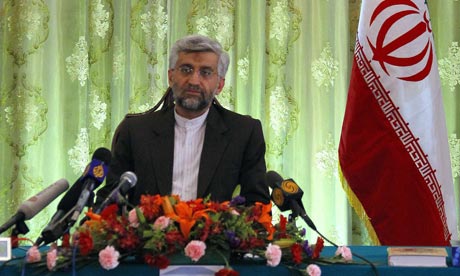Iran nuclear talks under way in Geneva
Tension mounts over Tehran's claim of a breakthrough in uranium production and attacks on nuclear scientists

International talks on Iran's nuclear programme got under way this morning amid tension over Tehran's claim of a breakthrough in uranium production and attacks on Iranian nuclear scientists.
Diplomats from six major powers have come to Geneva to meet Iran's chief nuclear negotiator, Saeed Jalili, in the first such talks for more than a year. The discussions kicked off around a long oval table in a nondescript conference centre, amid low expectations.
Iran took a step towards nuclear self-sufficiency yesterday, using locally mined uranium for the first time in an act of defiance on the eve of resumption of talks with major powers over its atomic programme.
The Atomic Energy Organisation of Iran announced it had used domestically produced uranium yellowcake (refined ore) at its conversion plant in Isfahan. The mining and milling of uranium ore is not banned by UN resolutions (which focus on uranium enrichment), but one of the ways the international community has sought to terminate Iran's nuclear programme is to stop it importing yellowcake.
Yesterday's announcement appeared to signal that such measures would not stop Iran pursuing its nuclear ambitions. For the time being, however, it is little more than a symbolic step as Iran's ore deposits are mostly low grade and its capacity to produce yellowcake is limited.
The timing of the announcement is unlikely to be accidental, observers said, coming the day before Jalili is due to meet diplomats to resume a dialogue over Iran's ambitions after a break of 14 months.
Rhetoric from the Iranian leadership has repeatedly played down the talks, and turned hostile after the assassination of a nuclear scientist and the wounding of another in attacks in Tehran.
Jalili is expected to repeat allegations made by President Mahmoud Ahmadinejad that the nuclear scientist killed last Monday, Majid Shahriari, and his wounded colleague, Fereidoun Abbasi, were victims of attacks by the west and Israel.
Iran's foreign minister, Manouchehr Mottaki, linked the attacks to UN security council resolutions against Iran. "By adopting the UN resolutions against our country's nuclear scientists, in fact terrorist groups were given the mission to carry out these assassinations in Iran under the direction of spy services," he said at a conference in Bahrain on Saturday.
Abbasi was named in a 2007 UN resolution as involved in banned nuclear activities.
The intelligence minister, Heidar Moslehi, announced that several people had been arrested in connection with the attacks and claimed they had links with western intelligence agencies and the Mossad.
The Tehran regime has shown no sign of making concessions over the central issue – UN demands for Iran to suspend its enrichment of uranium. Tehran insists the programme is for peaceful means, and portrays the UN sanctions against it as an attempt to deny its sovereign rights.
Although Tehran accepted the invitation to talks from Europe's foreign policy representative, Catherine Ashton, who specified that the discussion would focus on the nuclear programme, there is no guarantee that Jalili will even agree to discuss the topic. There is no set agenda, and Iranian delegates to such meetings have in the past brought a long list of other issues to discuss.
The international delegation on the Geneva talks – sometimes known as the P5+1 group, meaning the permanent five UN security council members plus Germany – will try to measure Iran's response to the latest wave of UN sanctions, imposed in June.
They will also attempt to revive a proposal to exchange Iranian low-enriched uranium for ready-made fuel rods for a research reactor in Tehran. The proposed deal was the most important result of the last P5+1 meeting with Iran, in Geneva in October 2009.
Jalili initially accepted the deal, apparently with Ahmadinejad's backing, but it later fell apart after disagreement within the Tehran regime and subsequent Iranian attempts to renegotiate terms.
The P5+1 group may draw some comfort from yesterday's announcement on the use of Iranian yellowcake, seeing it as confirmation that their efforts to cut Iran off from external supplies are working. A year ago, it was reported that a clandestine attempt to import 1,350 tonnes of purified ore from officials in Kazakhstan was thwarted when the Kazakh government discovered the deal. Tehran denied the report as baseless.
The yellowcake delivered to Isfahan came from the Gchine mine at Bandar Abbas on the Persian Gulf. It is an open-cast mine described by the International Atomic Energy Agency (IAEA) of having "low but variable grade uranium ore". The IAEA predicted it would produce 21 tons of yellowcake a year, about a tenth of the amount an industrial reactor would require.
Michael Adler, an expert on the Iran programme at the Woodrow Wilson International Centre for Scholars, said: "It doesn't really change much. They have what they need at this point to continue enriching uranium. It shows their ongoing work to master the complete nuclear fuel cycle, but it is not a sea-change in their current capabilities. Its real significance is that it shows their strong political will to win recognition of their right to do what they want with their nuclear technology."
